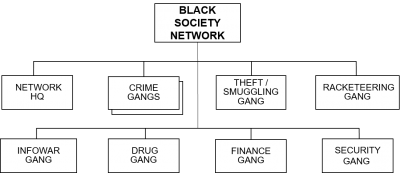Black Societies
There are a number of “black societies” or organized criminal networks in the largest cities in Olvana. These criminal networks are normally family affairs, with each family staying local to avoid conflict with other groups. These criminal networks are involved in armed robbery, racketeering, smuggling, narcotics trafficking, prostitution, gambling, and contract killings. These groups are not happy with the Tantoco Cartel moving into Olvana, and may fight them to keep Tantoco out. On the other hand, as both groups have attempted to move in to Belesia, they have implemented tacit agreements over area control.
These groups are normally named after a color and an animal, usually a bird of prey. These are the most prevalent groups by city:
- Hong Kong: Blue Crescent
- Shanghai: Red Eagle
- Nanning: Green Hawk
- Guangzhou: Jade Vulture
- Shantou: Black Owl
- Xiamen: Yellow Tiger
The Black Societies are well entrenched and participate in kidnapping, extortion, gambling, and have heavy involvement in the country's narcotics trade and money laundering. Drug trafficking includes cultivating marijuana and hashish in Belesia, producing methamphetamine in Olvana, and importing various drugs from Africa. For the most part, Olvana is used as a transshipment point, rather than as a customer base. Ease of smuggling, along with an extant expatriate population, is one of the main reasons for the Societies to expand into Belesia.
The Black Societies are a very hierarchical organized crime element. Formed in the 17th century to restore Dynastic Rule, they maintained a rigid central control over the behavior and activities of its members, who regarded themselves as blood brothers, expecting complete loyalty in return. At the turn of the last century, the organization gradually disintegrated into many separate societies—or gangs—that operate independently from each other in different parts of Olvana. When the Communist Party took power, many Society members escaped to Olvanese neighborhoods in overseas countries, together with thousands of refugees. With the infiltration of criminal elements, some of these refugee groups gradually transformed into expatriate Black Societies, using violence to protect their dominated territory. Because of their entrenched subculture and cohesion, Black Society gangs are effective in enforcing control in local territories. Various Black Societies experienced a process of returning to Olvana because of the economic growth and rising demand for limited goods and services. They network with Olvana officials and enterprises and forge cooperative relationships, trying to capitalize in the booming underworld.
A business approach developed alongside traditional crime. The Black Societies engage in legitimate businesses and work with entrepreneurs and professionals to make financial gains in business markets. However, their hierarchical structure is incompatible with the dynamic nature of many forms of transnational organized crime, and while the Black Societies may be located worldwide, they tend to keep operations localized. They are responsible for the exportation of sex workers and dangerous drugs from Olvana through the special administrative regions. The majority of human trafficking in Olvana is internal. This domestic trafficking is the most significant human trafficking problem in the country. Criminal elements lure women and children through false promises of legitimate employment into forced labor and commercial sexual exploitation both in Olvana and throughout Asia. Men are smuggled to countries throughout the world for exploitative labor. Olvana is one of the largest origins of human trafficking victims, with final destinations primarily in the Middle East, the United States, and, to a lesser extent, Western Europe.
An early focus of the Olvanan government during the Cheng Revolution was to reduce the prevalence of narcotics and gambling and decrease the influence of criminal gangs. These efforts led to a decrease in many violent crimes including larceny, arson, rape, murder, and robbery. Large segments of the Black Societies fled to Olvanese communities around the world. However, the remaining Black Societies took advantage of the uncertainty to focus on economic crimes economic crimes, including tax evasion, theft of public property, and bribery. The relaxation of numerous economic and social restrictions over 40 years ago resulted in a large-scale return of Black Society members.

